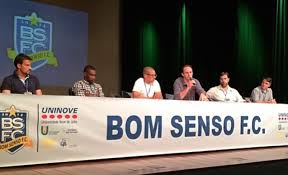By Samindra Kunti
December 15 – Brazilian football needs its own 1992 Premier League moment – with Bom Senso that moment may have finally arrived in the country that lit up the world stage with its teams and players.
Brazil and football have always been synonymous. For many fans Brazil embodies the beautiful game and its players excel virtue of technical superiority, tactical refinement and natural improvisation. The history of Brazilian football at international level is rich and illustrious: five world cup wins have provided numerous legends such as Leonidas da Silva, Garrincha, Pele, Zico and Socrates, and unforgettable moments.
Yet the grandeur and pomp has faded from the beautiful game in Brazil.
Last week the FBI indicted the high commander of the Brazilian FA (CBF) Marco Polo Del Nero, further weakening the organisation’s already rock-bottom credibility. The investigations of Swiss and American authorities also entrapped Jose Maria Marin and Ricardo Teixeira, Del Nero’s predecessors. All three were key figures in the organisation of the 2014 FIFA World Cup.
Marin has been extradited to the USA, where if found guilt he may serve 20 years in jail. Del Nero and Teixeira are hiding in Brazil behind the country’s virtually non-existent 1960’s extradition treaty with the US and a long history of non-enactment of extraditions. Both are accused of soliciting and taking bribes.
Just hours after the indictment, including charges of racketeering and money laundering, Del Nero took a temporary leave of absence and CBF vice president Marcus Antonio Vicente replaced him. Vicente is another from the old school of Brazilian football, who for years has been accused of mismanagement of football in Espirito Santo, a state just north of Rio de Janeiro.
Brazil’s institutional crisis has left the game in a grim state: the CBF is fragile, the national team is stagnant, the clubs are mired in debts, 85% of the players earn little more than the minimum wage, the calendar is out-of-sync with the rest of the world and attendances keep dropping. Brazilian football has become at best a protracted tragicomedy. The Seleção always ensured a happy ending, but an unforgiving 7-1 defeat by Germany demonstrated Brazil’s brittleness and recovery has been slow, if non-existant.
The recent Copa America further exposed Brazil’s fallibilities – there was neither pragmatism nor expediency in Brazil’s game, Dunga’s team simply turned boorish. The cynical approach didn’t yield results though and Brazil crashed out in the quarterfinals.
Brazilian football’s timeline is of a death foretold; the antidote requires surgical change in the pyramid of Brazilian football and a revolution at grassroots and club level.
In England the biggest clubs broke away from the Football League in 1992 to create their own top-flight division: the Premier League, today’s the world’s most lucrative and watched league. Those clubs realised their potential and no longer wanted to defer to a league with old structures and differing interests.
In Brazil a split was eminent in 1987 when the CBF faced bankruptcy and was no longer in a position to cover the running costs for Brazil’s domestic league. Brazil’s biggest clubs formed the ‘Clube Dos 13,’ organising their own tournament, generating profitable sponsorship deals with Brazilian TV behemoth Globo and Coca-Cola.
‘The Clube Dos 13’ backpedalled as the group’s president Carlos Miguel Aidar, who recently resigned as president of Sao Paulo FC over allegations of corruption, reconciled with CBF boss Nabi Abi Chedid and abandoned plans for a second independent competition in 1988.
The new organisation’s influence diminished and today it’s in effect little more than a CBF branch, debating the league’s television revenue model.
In 2013 a new hope surged with the arrival of player-run movement Bom Senso FC (Common Sense FC), reminiscent of the ‘Corinthians Democracy’ in the 80’s under the leadership of Socrates and Casagrande.
Bom Senso, which has the support of Dida, Gilberto Silva, Juninho, Clarence Seedorf, Cris, Alex Souza and Paulo André, mobilised the Brazilian public to push for reforms in Brazilian football and vociferously campaigns for improved conditions for players and clubs in Brazilian football as well as the introduction of Financial Fair Play, and a refinancing of the clubs’ €0.95 billion debt with government.
Last week Bom Senso protested against Del Nero, demanding his resignation with hundreds of players across Brazil folding their arms across their chest for fifteen-seconds before the final match day of the season. “Del Nero must go – now,” the player group tweeted. “We want clean elections.”
CBF and football administrators have desperately attempted to sideline Bom Senso to protect their power and privileges, but the progressive movement expressed an interest in entering the political arena, notwithstanding all the adversity.
“The hour of profound change, of a serious revolution is now,” said Alex Souza in an interview to local media. “With governmental intervention at the CBF. It doesn’t work to continue this way. That’s clear. Brazilian football has come to a standstill in time. The model has failed. It is necessary to act now when the persons, who administer badly, are weakened with these accusations. Brazilian football is fragile and outdated. Bom Senso will launch a candidate for the CBF elections in 2018.”
“The plan is for Bom Senso FC to put forth someone as a candidate for the next CBF presidential elections,” continued Alex. “In 2017 or 2018. But you have to fight this system. The domino effect at the top of the CBF gives us hope that everything will change. Even the system of elections. They [CBF] are weakened.”
If Bom Senso can see their Robin Hood mission through and topple the old fiefdoms, Brazilian football may again emerge as a global superpower.
Contact the writer of this story at moc.l1745175408labto1745175408ofdlr1745175408owedi1745175408sni@i1745175408tnuk.1745175408ardni1745175408mas1745175408

